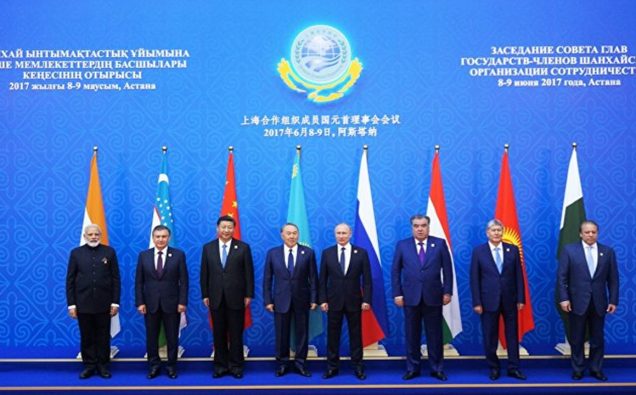
In a major geo-strategic development, Pakistan and India gained full full member status in Shanghai Cooperation Organization that held its summit in the Kazakh capital of Astana on Friday. The organization seeks to expand political, economic and military cooperation among member countries.
Formed in 2001, the SCO comprises six member states, mainly focusing on military cooperation between the members which involves intelligence sharing and counter-terrorism operations in Central Asia.
Pakistan and India ─ the two influential South Asian countries that until now had been observers ─ have become the first nations to be inducted as members since the formation of the organization.
The inclusion of the two nuclear-armed neighbors is seen as a big regional development as Pakistan and India are often at odds with each other. Both are close U.S. friends but have serious differences and disputes like Kashmir to resolve – a prospect that will decide the future of the region.
Prime Minister Nawaz Sharif hailed his country’s inclusion in the grouping noting that, “the SCO goals resonate with Pakistan’s national ethos, and so do the core values of the Shanghai spirit and the SCO charter with our own quest for peaceful neighborhood.”
Sharif welcome a proposal made by Chinese President Xi Jinping on a five-year treaty for good neighborliness among SCO members, and thanked the founding members including China, Russia and others for their staunch support to Pakistan.
“As leaders, we should leave a legacy of peace and amity for our
future generations, not a toxic harvest of conflict and animosity. Instead of talking about counter-weights and containment, let us create shared spaces for all,” Sharif said.
He added that in the coming decades, the SCO, which has emerged as a ‘sheet anchor’ for regional stability would serve as a strong link between Asia Pacific, East Asia, West Asia and the Atlantic region.
“It is destined to become a cornerstone of global politics and economics, with economics gaining primacy,” he said.
“The SCO gives us a powerful platform for partnerships to promote peace, build trust and spur economic development for shared prosperity.”
“Moreover, it helps us all combat terrorism, reduce arms race, eliminate poverty… deal with natural disasters, tackle climate change and assure water security,” he added.

















